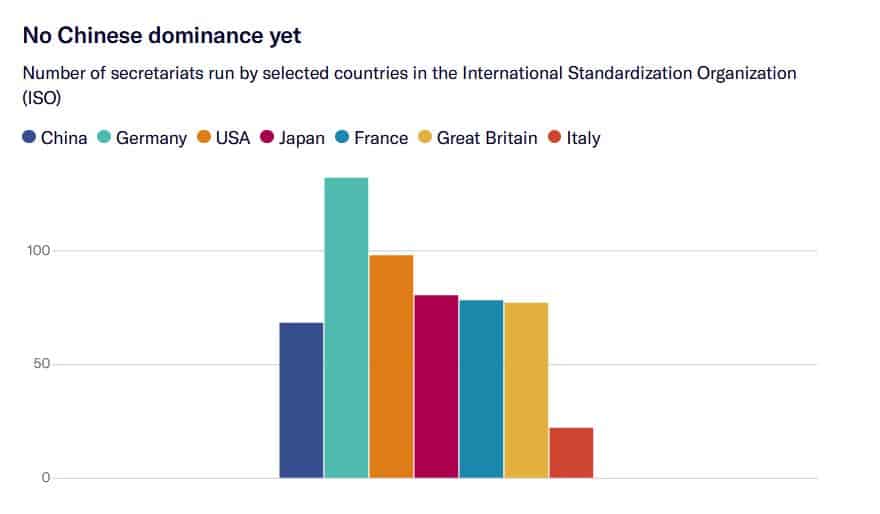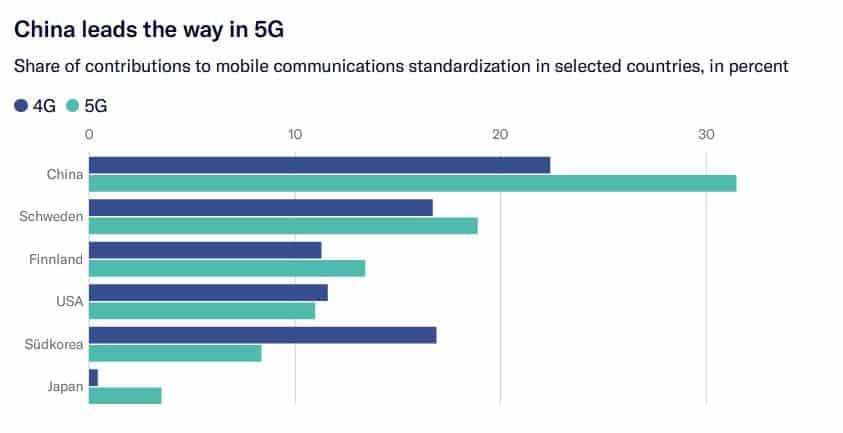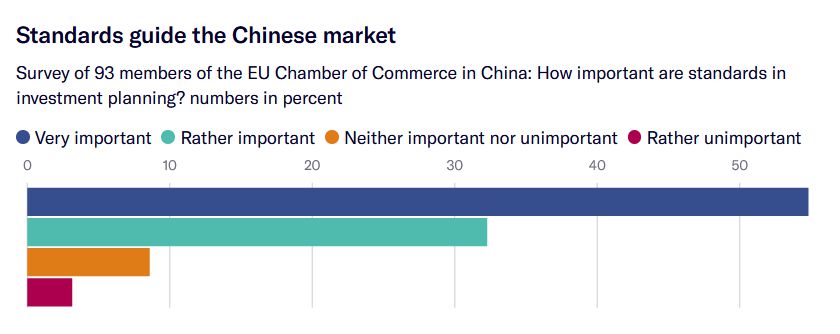It’s about secret meetings, hidden barriers and discrimination: The EU Chamber of Commerce in China criticizes Beijing in a new study. China is striving to control digitization not only in its own country but also in international organizations.
In order to be able to connect to the WLAN with every laptop model anywhere in the world, global standards for data rates and frequency bands are required. Without cellular standards, we would not be able to reach the Huawei device in China with an iPhone from the US. We don’t even notice them, technical standards so naturally determine our lives.
For a long time, the world community pulled together to make this compatibility possible. But the global battle for technical standards has long since begun. The conflict over the expansion of the 5G network infrastructure by the Chinese telecom group Huawei is only the best-known case. European companies in China and diplomats in the International Telecommunication Union (ITU) are already clearly feeling the fact that a new geopolitical dispute is taking place in the field of standardization.
Standards shape the future
“Technical standards have become a new arena of confrontation between mainly the US and China,” said Tim Rühlig recently at an online media conference.
A paper on the “race to control technical standardization,” co-authored by a China expert from the Swedish Institute of International Affairs and the EU Chamber of Commerce in China, was released on Thursday.
The study is based on surveys and interviews with many dozen companies in China and shows how the European business world experiences the race for standards in everyday life in China.
The topic is relevant in several ways. According to Rühlig, standards have shaped three determining trends of the present: the digital transformation, the shift towards CO2 neutrality and the rivalry between the US and China. This involves questions such as: who receives license fees, who has to pay them? Are companies and countries becoming dependent on certain providers? And are standards set in terms of privacy and zero emissions, or are other standards set?
China, of course, wants a role in these matters, especially given the country’s rapid rise to the world’s second largest economy.
In general, standardization follows economic development, says Jovan Kurbalija, head of the Geneva Diplo Foundation, which deals with the interface between diplomacy and digitization. But in the case of China, this process is accelerating because the country wants to expand its global position of power.
Huawei’s success with the 5G cellular standard
This can be seen in concrete terms in the international organizations that set these standards. Despite strong growth, China is still a long way from dominating the secretariats of technical committees and working groups, for example in the International Organization for Standardization (ISO) – Germany, the USA and Japan still set the tone here. The secretariats exert an “enormous” influence by “structuring, coordinating and organizing” the standardization process, as stated in the study by the EU Chamber of Commerce in China.

But China is doing a lot to change that, the study noted. Between 2015 and 2020, for example, the country took on the leading role in ISO committees for the standardization of rare earth metals and e-commerce. This corresponds to the key sectors of Beijing’s industrial policy, specifically the “Made in China 2025” strategy, the study finds.
In another area, the 5G cellular standard, China was able to celebrate an important success this year. At the beginning of the year, the members of the ITU agreed on the first global rules on 5G. The Geneva-based UN organization consists of 193 countries and over 900 companies and other private organizations. It sets global telecommunications and internet standards.
The new 5G standard largely corresponds to the technology developed by the Chinese company Huawei. That doesn’t mean that every country is now forced to use this 5G standard. Other companies can develop similar technologies that conform to the standard.
But Huawei has a considerable head start thanks to the decision of the ITU. The company only needs to adjust its 5G technology marginally and can now deliver its base stations and other network components faster than its competitors – so Huawei is not excluded from the target market due to security concerns. The German industrialist Werner von Siemens already knew that whoever owns the standard, owns the market.

China’s “state-centered” approach
China’s influence within many standardization organizations is also increasing because the Chinese delegations are larger and in some cases better prepared than their western counterparts, says Jovan Kurbalija from the Diplo Foundation.
“China follows the rules of the UN system. But it plays better than it did a few years ago.”
Tim Rühlig and the EU Chamber of Commerce mainly criticize the type of procedure. China’s “much more coordinated approach” is very different from Western practices, says Rühlig. The government attaches great importance to the fact that the state and companies speak with one voice – and they control that. There are examples of delegates having to document their voting decisions with photos and show them.
In general, the competition for standards is not just about who sets which standards, but also about how they are set. According to Rühlig, the process in Europe is primarily driven by private actors. This approach is based on the assumption that companies know best which standards make sense. China, on the other hand, has only recently switched from a completely “state-controlled” to a “state-centred” approach, says Rühlig.
But even where there is no “State” on it, the state is still often involved in China and asserts its interests. In a survey by the EU Chamber of Commerce in China, for example, 12 percent of the companies surveyed report that they are prevented from participating in state standardization activities.
Although China has legally committed itself to give foreign companies equal access to standardization activities, according to the Chamber of Commerce, foreigners are often left out. In important sectors such as pharmaceuticals, chemicals, automobiles, information technology and telecommunications, so many obstacles are often placed in the way of foreign companies that ultimately a third of the companies would not be able to participate in the standardization. In some sectors, foreign companies are even excluded from the outset, for example in cryptography, says the President of the EU Chamber of Commerce, Jörg Wuttke.
Many companies also complain about de facto restricted participation rights. According to Wuttke, it happens “very, very often” that foreign companies notice in a regular meeting that their Chinese interlocutors must have agreed with each other beforehand. According to the study, this applies to the China Communication Standards Association, which is responsible for the IT sector. Technical leadership positions in this association are therefore reserved exclusively for the Chinese, more precisely: members of the Communist Party.

Increasing confrontation in the UN system
According to Roxana Radu, a specialist on Internet regulation at the Institute for International Studies in Geneva, some disputes within the UN agency have become less technical and more combative because of the politicization of standardization. Former ITU official Richard Hill says that the world is becoming less likely to agree on major technology standards..
In small workgroups that deal with the formatting of bits and bytes, for example, everything still works very smoothly, says Hill.
“But as soon as topics of greater importance are dealt with, such as artificial intelligence or cybersecurity, two blocks face each other. It’s worse than in the Cold War.”
However, this blockade is not solely due to China. The US and its allies also have a great interest in exporting their standards and are also becoming less and less cooperative.
In October 2022, the member states of the ITU will elect a new Secretary-General. The Chinese Houlin Zhao will step down after eight years at the helm of the Telecommunications Union.
While Zhao was elected twice without an opponent, there will probably be a fight vote in 2022: The US and Russia have already nominated their candidates for the head of the ITU.
China can no longer put up a candidate as it rotates, but the Russian aspirant for the top position, Rashid Ismailov, is not unknown in China. He can look back on a long career in the Russian telecommunications industry – including as a manager at Huawei.
Image Credit: Getty
You were reading: “Worse than the Cold War” – China is also putting pressure on the US and Europe in terms of technical standards
